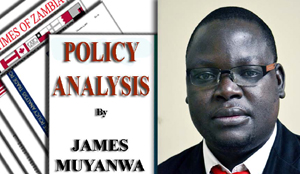 RECENTLY my friend and I were discussing the performance of the Food Reserve Agency (FRA) and its mandate in reserving the staple food.
RECENTLY my friend and I were discussing the performance of the Food Reserve Agency (FRA) and its mandate in reserving the staple food.
In its current form the agency faces a lot of challenges, mainly emanating from the expectations of the members of the public especially the small scale farmers who form the majority of its clientele.
The situation is compounded by the fact that people’s expectations from the FRA are totally different from its mandate.
Established under the Food Reserve Act of April 1995 the FRA aims at becoming an organisation that efficiently manages sustainable National Strategic Food Reserves, ensuring National Food Security and Income through the provision of complementary and high quality marketing and storage services.
But the Zambians, particularly the small scale farmers, expect the FRA to provide the market for all their crops, which are currently deemed strategic, like maize.
Any failure by the agency to procure the crops, especially maize, from the farmers is considered to be a failure on the part of the government.
FRA is considered to be the first port of call for the Zambian maize farmers wanting to sell their crop.
This is, unfortunately, contrary to its mandate as the buy of the last resort.
As the buyer of the last resort, the FRA is only supposed to buy the amount of maize for strategic reserve to replace wasted crop but unfortunately that is not the view the members of the public have.
This poses a big challenge.
For instance from the 2013/14 farming produce, the FRA had only budgeted for 500,000 tonnes of maize and the funds for that had been set aside.
The bumper harvest and the farmers continued reliance on the FRA for the provision of the market for especially maize, could have resulted into most of the crop going to waste.
The private sector, either deliberately or otherwise, did not do much to procure the surplus thereby compelling the government to buy more than 100 per cent over and above the planned amounts of maize.
This had its own implications in that the government did not have money in place to pay the funds for the surplus maize.
The effects that had on the payment are now history from which leaders could only draw lessons.
Generally, the government, through the FRA, sets the floor prices for the maize and other strategic crops.
But this is also a source of problems because both the farmers and the potential buyers from the private sector take these prices as the ceiling prices.
Consequently, most private entities who participate in the purchase of maize pay lower than the floor prices, hence discouraging the farmers from selling the crop to them.
If the private entities were offering better prices than those offered by the FRA the farmers would not always be waiting for the FRA to start buying the maize.
Connected to that is the way some government officials and the media take any individual buyer of maize. They described any individual who wants to buy the maize as “unscrupulous briefcase business men or women”.
Every time at the onset of the marketing season, the government officials, especially district commissioners warn the small scale farmers against selling the crops to unscrupulous business people.
They say farmers should wait for the FRA to start buying the maize.
This is unfortunate in that the so called briefcase business people can easily bridge the market gap if encouraged.
There is a general feeling that the FRA should be restructured while its mandate should be changed to make it capable to discharge the expected larger responsibility as the provider of the wholesale market for maize and other strategic crops.
Having witnessed the just-ended presidential campaigns, I remember some of the proposed names for the restructured FRA as Grain or Crop Marketing Agency and reversion to the National Agricultural Marketing Board .
If the change of name is supported by the extension of the current FRA’s mandate then those changes would be worthwhile.
Given the fact that the main target for the FRA market are the small scale farmers who benefit from the Farmers Input Support Programme (FISP) I would further suggest that FISP should be allocated to the FRA.
This will prove to be handy in situation where the FRA delays the payment of the procured maize. FRA will provide the input for the next season in lieu of the payment for the maize or any other crops.
For instance, if this year that arrangement existed the farmers who have been paid late could have accessed the FISP from FRA on time even before they got paid their dues.
The FRA can also take up the responsibility to provide extension services to help increase the productivity among the small scale farmers.
I feel that the current low productivity is to blame for the small scale farmers’ failure to graduate into medium scale and major scale farmers and therefore that could go a long way.
I will extend the discussion next week as I look at the mooted district milling plants to be run by cooperatives so that we see how that can fit in the proposed new FRA.
*****I reckon by the time you will be reading this Zambia’s Sixth Republican President will have been known and if so I would like to say congratulations to him/her! God Bless Zambia!
For comments call: 0977 246099, 0955 431442 or e-mail: jmuyanwa@gmail.com






